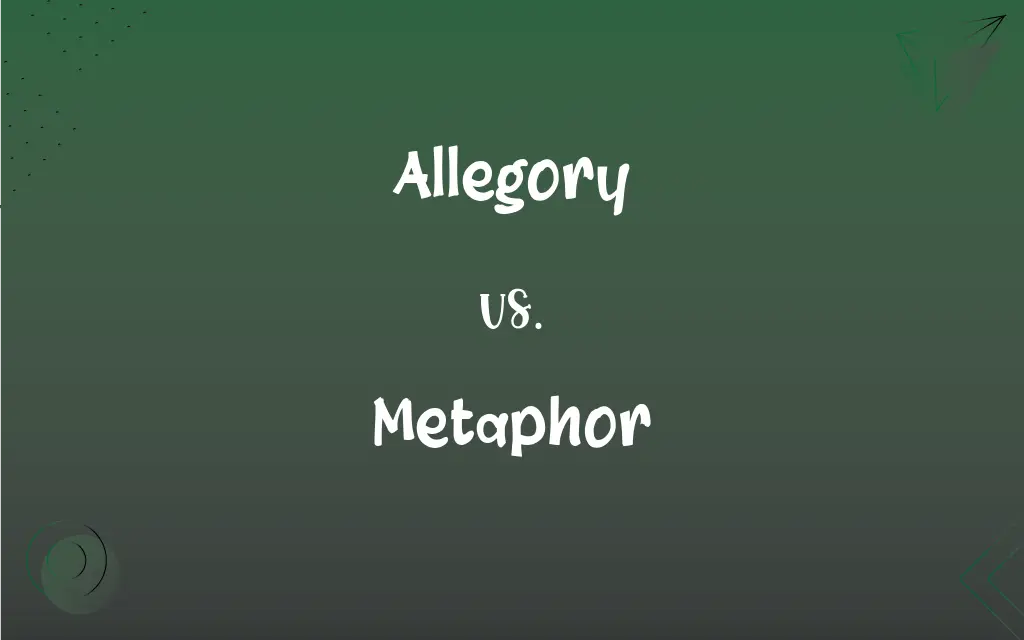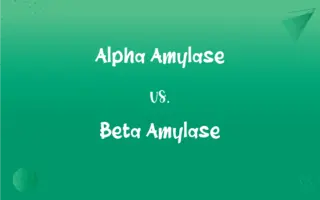Allegory vs. Metaphor: What's the Difference?
Edited by Janet White || By Harlon Moss || Updated on October 23, 2023
An allegory is a narrative with a symbolic meaning, while a metaphor is a direct comparison between two unlike things.

Key Differences
Both allegory and metaphor are literary devices used to convey deeper meanings or insights. An allegory is a story, poem, or picture that can be interpreted to reveal a hidden meaning, usually moral or political. These meanings are conveyed through characters, events, and settings that represent abstract ideas or concepts.
A metaphor, on the other hand, is a figure of speech that makes an implicit comparison between two unrelated things without using "like" or "as." It asserts that one thing is another, not just like it, to suggest a likeness or analogy between them.
One way to understand the distinction between allegory and metaphor is through their length and complexity. Allegories are extended and can encompass an entire narrative, whereas metaphors are typically concise, often fitting into a single sentence or phrase. For instance, George Orwell's "Animal Farm" is an allegory for the Russian Revolution, while saying "time is a thief" is a metaphor.
Another key difference lies in their purpose. While both aim to convey deeper meanings, an allegory usually serves to communicate a broader message or teach a lesson through its characters and plot. A metaphor, conversely, focuses on drawing a vivid picture or creating a striking effect by juxtaposing two distinct entities.
In summary, while both allegory and metaphor convey deeper or hidden meanings, the former does so through an extended narrative, and the latter through a direct comparison between two unrelated things.
ADVERTISEMENT
Comparison Chart
Definition
A narrative with symbolic meaning
A direct comparison between two unlike things
Length
Extended
Typically concise
Use of comparison
Implicit throughout a story
Direct and explicit
Examples
"Animal Farm" by George Orwell
"The world is a stage"
Purpose
Communicate broader messages or lessons
Create striking effects or vivid imagery
ADVERTISEMENT
Allegory and Metaphor Definitions
Allegory
An allegory is a narrative where characters and events symbolize deeper meanings.
The Lion, the Witch and the Wardrobe is often interpreted as a Christian allegory.
Metaphor
A metaphor lends attributes of one thing to another for illustrative purposes.
The heart of the matter is honesty.
Allegory
An allegory represents abstract ideas through characters, events, and settings.
Plato's Allegory of the Cave explores the nature of reality and enlightenment.
Metaphor
A metaphor asserts a direct comparison between two unlike entities.
Her voice is music to my ears.
Allegory
Allegories convey moral, political, or spiritual truths.
Orwell's Animal Farm is an allegory critiquing totalitarian regimes.
Metaphor
Metaphors suggest a likeness or analogy without using "like" or "as."
The world is a melting pot of cultures.
Allegory
Allegory uses symbolic figures or actions to convey truths or generalizations.
Pilgrim's Progress is an allegory about the Christian journey to salvation.
Metaphor
Metaphors can enhance descriptions and evoke strong imagery.
His words were a dagger to her heart.
Allegory
An allegory can be a story, poem, or picture with a hidden or symbolic meaning.
The painting was an allegory of human ambition and downfall.
Metaphor
A metaphor implies that one thing is another to draw a parallel.
The classroom was a zoo today.
Allegory
The representation of abstract ideas or principles by characters, figures, or events in narrative, dramatic, or pictorial form.
Metaphor
A figure of speech in which a word or phrase that ordinarily designates one thing is used to designate another, thus making an implicit comparison, as in "a sea of troubles" or "All the world's a stage" (Shakespeare).
FAQs
Do metaphors always avoid "like" or "as"?
Yes, those using "like" or "as" are similes, not metaphors.
How does a metaphor differ from an allegory?
A metaphor is a direct comparison between two unlike things, while an allegory is a story with a symbolic meaning.
Are allegories always fictional?
While many are, allegories can also be found in non-fiction, especially in philosophical or religious texts.
Can an allegory be a short poem?
Yes, allegories can be found in various forms, including short poems.
Can a metaphor be a single word?
Yes, sometimes a single word can be metaphorical, depending on the context.
What's the main purpose of a metaphor?
To create vivid imagery or a striking effect by comparing two distinct things.
Can a work contain both allegories and metaphors?
Yes, many works integrate both to enrich their narratives and meanings.
Is symbolism the same as allegory?
No, while allegories use symbols, not all symbolic works are allegorical.
Are all allegories long narratives?
Not necessarily, but allegories often unfold over extended narratives to convey their meanings.
Is every story with symbols an allegory?
No, a story with symbols isn't always an allegory; allegories have consistent symbolic meanings throughout.
Can an allegory have multiple interpretations?
Yes, allegories can be open to various interpretations based on the reader's perspective.
Is "Life is a rollercoaster" a metaphor or allegory?
It's a metaphor, comparing life to a rollercoaster for its ups and downs.
Can allegories be humorous?
Certainly! Some allegories use humor to convey their messages or critique society.
Are all metaphors rooted in truth?
Not necessarily. Metaphors aim to illustrate or emphasize a point, not always to depict reality.
Why are metaphors important in language?
Metaphors enrich language, add depth to expressions, and make abstract ideas tangible.
What is an allegory?
An allegory is a narrative that uses symbolic characters or events to convey deeper meanings, often moral or political.
Are metaphors purely literary devices?
No, metaphors are pervasive in everyday language and aren't limited to literature.
Why are allegories used in literature?
Allegories can communicate complex ideas, morals, or criticisms in a more accessible and engaging manner.
What makes a metaphor effective?
An effective metaphor draws a clear, imaginative, and insightful parallel between two unrelated entities.
Are idioms and metaphors the same?
No, while both are figurative expressions, idioms have established meanings not directly derived from the literal words.
About Author
Written by
Harlon MossHarlon is a seasoned quality moderator and accomplished content writer for Difference Wiki. An alumnus of the prestigious University of California, he earned his degree in Computer Science. Leveraging his academic background, Harlon brings a meticulous and informed perspective to his work, ensuring content accuracy and excellence.
Edited by
Janet WhiteJanet White has been an esteemed writer and blogger for Difference Wiki. Holding a Master's degree in Science and Medical Journalism from the prestigious Boston University, she has consistently demonstrated her expertise and passion for her field. When she's not immersed in her work, Janet relishes her time exercising, delving into a good book, and cherishing moments with friends and family.































































